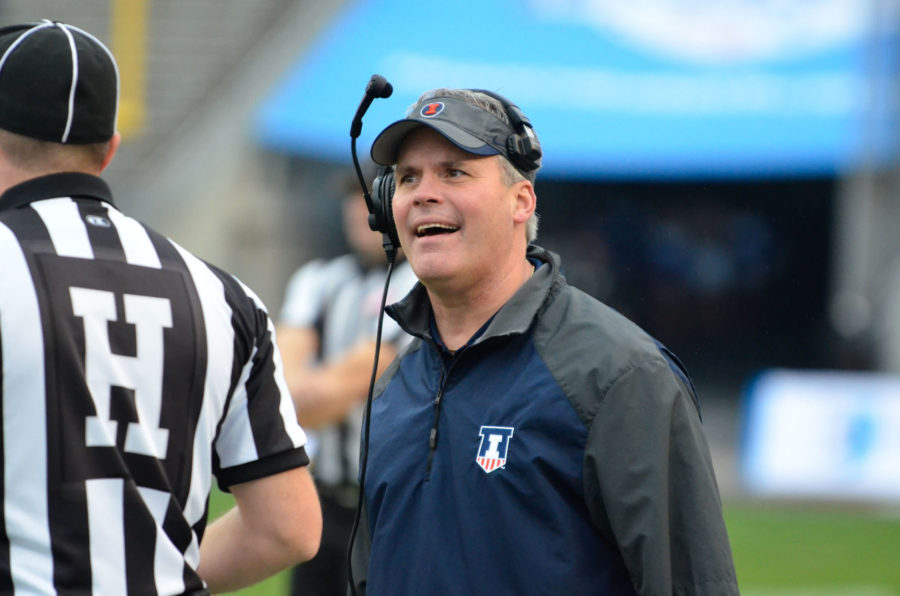Illini coaches torn on issue of pay for play
Illinois’ head coach Tim Beckman yells at a referee for a penalty call during the Zaxby’s Heart of Dallas Bowl against Louisiana Tech at Cotton Bowl Stadium in Dallas, Texas on Friday, Dec. 26, 2014. The Illini lost 35-18.
May 5, 2015
For years, collegiate student-athletes have been amateurs, not allowed to accept payment for on-the-field services.
Student-athletes have not been permitted to receive financial compensation for use of their likeness, number or autograph. But, at January’s NCAA convention, the Power Five conferences — the Big Ten, SEC, Pac 12, Big 12 and ACC — passed a cost-of-attendance measure that pushes pay for play closer to reality.
While the system may be imminent, everyone in the Illinois athletic department isn’t onboard.
“I’m against the pay for play system across the board,” Illinois men’s track and field head coach Mike Turk said. “I think that all of our people here are still student-athletes. I realize that there’s money generated and the University reaps the benefit of that. But there’s tremendous amount of money and resources put into providing support for student athletes.”
While a pay-for-play system would vary drastically between sports and universities, a cost-of-attendance policy is a smaller, more uniform substitute to a larger system.
Get The Daily Illini in your inbox!
The cost-of-attendance policy could be in effect as early as next fall, and it looks like Illinois will be one of the first schools to adopt the policy.
According to women’s basketball head coach Matt Bollant, Illinois will enact the policy next year. In doing so, the athletic department will provide a stipend between $3,000 to $5,000 a year for each athlete. The money is intended for things that scholarships don’t cover, like plane tickets home during school vacation.
Under the pay-for-play system, athletes would have the opportunity to be paid for use of their likeness, among other things. The athlete would receive money in addition to the scholarship provided by the school. This excess money would be the “pay” aspect of the system and would be determined based on how much money the athlete was able to bring in for the school.
In 2014, Big Ten Commissioner Jim Delaney said he did not support paying student-athletes, but every Big Ten school voted in favor of the cost of attendance at January’s conference. The new policy comes just a year after Northwestern football players attempted to unionize in a move that was supported by the National Labor Relations Board and is expected to be challenged by the NCAA in the U.S. Supreme Court.
“You see it in lots of different places where schools are profiting from these guys’ images,” said volleyball head coach Kevin Hambly. “I’m not sure that this addresses that directly, but the ability to give players money, and especially the ones that really desperately need it, is great.”
Hambly added that with the volleyball team he recruited potential players who had a hard time scraping together the money to afford to attend Illinois. With the cost-of-attendance policy in place, Hambly said it will be easier for athletes to buy plane tickets home as well as have a little bit more money in their pockets, which he is in favor of.
Although Hambly and Bollant both seem to be in favor of paying collegiate athletes, football head coach Tim Beckman said that he is in favor of helping his football players in any way that he can, but not for paying them excess money.
“I believe in amateurism,” Beckman said. “I believe that these players are very proud of the opportunity to play Division I football. (The players are) proud of the opportunity to get a college education from the University of Illinois. It’s a privilege, not a right, to be a college football player.
“I’m for taking care of the student athletes. They do a lot for us.”
@IlliniSportsGuy







